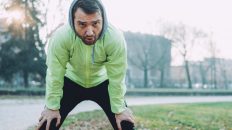By Edward Phillips, MD
Edward Phillips (MD):
Hi. I’m Dr. Eddie Phillips. I’m a physician specializing in lifestyle medicine and board certified in Physical Medicine and Rehabilitation.
When I talk with my patients about their workouts and physical activities, I always ask questions to determine if they’re exercising safely.
Here are some important tips to prevent injuries and get the most out of your workouts.
Take time to warm up and cool down properly.
Never sacrifice good form and posture for the sake of lifting heavier weights or finishing a set.
Boost your activity levels gradually. Unless you already exercise frequently and vigorously, work your way up to a strenuous routine rather than starting with it.
Don’t train too hard or too often because this can cause overuse injuries like stress fractures, stiff or sore joints and muscles, and inflamed tendons and ligaments. A mix of workouts, sports, and rest is a safer plan.
Pay attention to your body. Don’t exercise when you’re sick or fatigued from overtraining. Fatigue may increase your risk of injuries.
If you stop exercising for a while, ease off when you re-start by lifting lighter weights, choosing an easier workout, or doing fewer reps or sets.
Stay hydrated while exercising, especially when it’s hot or humid. If you’re working out especially hard, choose drinks that replace fluids plus essential electrolytes.
Choose clothes and shoes designed for your type of exercise. Replace shoes or sneakers every six months because the cushioning wears out.
Pay attention to sore muscles. Delayed soreness that starts 12 to 24 hours after a workout and gradually abates is a normal response to taxing your muscles. By contrast, if you have persistent or intense muscle pain that starts during a workout or right afterward, or muscle soreness that persists more than one to two weeks, call your doctor for advice.
In hot, humid weather watch for signs of overheating such as headache, dizziness, nausea, faintness, cramps or palpitations. On days when the thermometer is expected to reach 80° F or above, exercise during cooler morning or evening hours or at an air-conditioned gym.
Any time you exercise, it’s safest to call your doctor for advice if you experience notable dizziness or faintness, chest pain or significant or persistent shortness of breath.
Be good to your body by exercising safely.
Workout Workbook: 9 Complete Workouts to Help You Get Fit and Healthy. Harvard Health Publications, Gardiner J., Prouty J., Bean, J. (2014). Harvard Medical School Special Health Reports.




